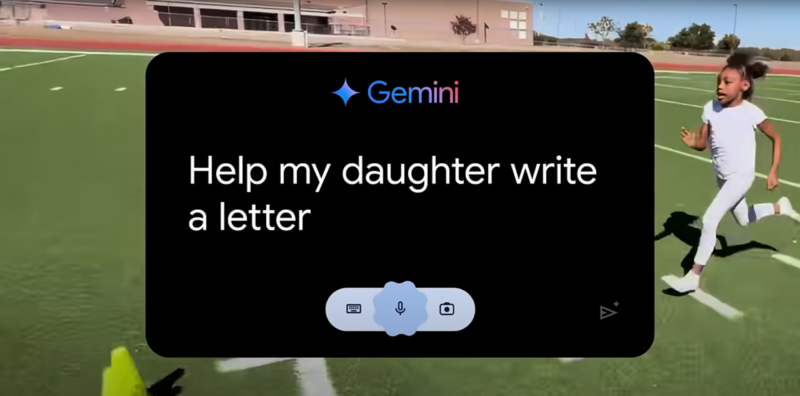
Enlarge / Here’s an idea: Don’t be a deadbeat and do it yourself!
If you’ve watched any Olympics coverage this week, you’ve likely been confronted with an ad for Google’s Gemini AI called “Dear Sydney.” In it, a proud father seeks help writing a letter on behalf of his daughter, who is an aspiring runner and superfan of world-record-holding hurdler Sydney McLaughlin-Levrone.
“I’m pretty good with words, but this has to be just right,” the father intones before asking Gemini to “Help my daughter write a letter telling Sydney how inspiring she is…” Gemini dutifully responds with a draft letter in which the LLM tells the runner, on behalf of the daughter, that she wants to be “just like you.”
Every time I see this ad, it puts me on edge in a way I’ve had trouble putting into words (though Gemini itself has some helpful thoughts). As someone who writes words for a living, the idea of outsourcing a writing task to a machine brings up some vocational anxiety. And the idea of someone who’s “pretty good with words” doubting his abilities when the writing “has to be just right” sets off alarm bells regarding the superhuman framing of AI capabilities.
But I think the most offensive thing about the ad is what it implies about the kinds of human tasks Google sees AI replacing. Rather than using LLMs to automate tedious busywork or difficult research questions, “Dear Sydney” presents a world where Gemini can help us offload a heartwarming shared moment of connection with our children.
The “Dear Sydney” ad.
It’s a distressing answer to what’s still an incredibly common question in the AI space: What do you actually use these things for?
Yes, I can help
Marketers have a difficult task when selling the public on their shiny new AI tools. An effective ad for an LLM has to make it seem like a superhuman do-anything machine but also an approachable, friendly helper. An LLM has to be shown as good enough to reliably do things you can’t (or don’t want to) do yourself, but not so good that it will totally replace you.
Microsoft’s 2024 Super Bowl ad for Copilot is a good example of an attempt to thread this needle, featuring a handful of examples of people struggling to follow their dreams in the face of unseen doubters. “Can you help me?” those dreamers ask Copilot with various prompts. “Yes, I can help” is the message Microsoft delivers back, whether through storyboard images, an impromptu organic chemistry quiz, or “code for a 3D open world game.”
Microsoft’s Copilot marketing sells it as a helper for achieving your dreams.
The “Dear Sydney” ad tries to fit itself into this same box, technically. The prompt in the ad starts with “Help my daughter…” and the tagline at the end offers “A little help from Gemini.” If you look closely near the end, you’ll also see Gemini’s response starts with “Here’s a draft to get you started.” And to be clear, there’s nothing inherently wrong with using an LLM as a writing assistant in this way, especially if you have a disability or are writing in a non-native language.
But the subtle shift from Microsoft’s “Help me” to Google’s “Help my daughter” changes the tone of things. Inserting Gemini into a child’s heartfelt request for parental help makes it seem like the parent in question is offloading their responsibilities to a computer in the coldest, most sterile way possible. More than that, it comes across as an attempt to avoid an opportunity to bond with a child over a shared interest in a creative way.
It’s one thing to use AI to help you with the most tedious parts of your job, as people do in recent ads for Salesforce’s Einstein AI. It’s another to tell your daughter to go ask the computer for help pouring their heart out to their idol.